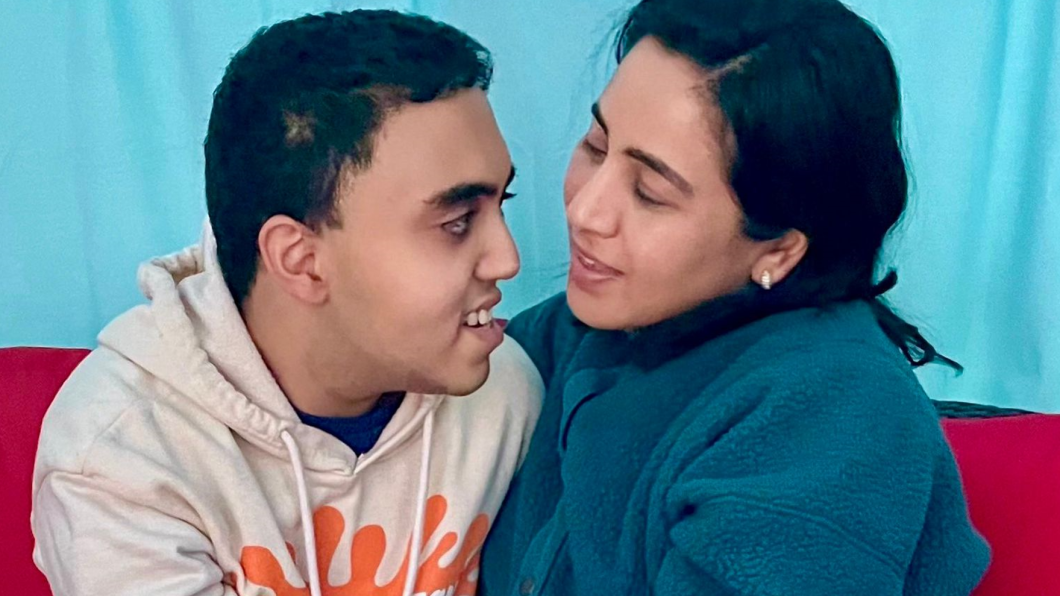
By Louise Kinross
During COVID, Gunjan Seth (photo right) became very sick and realized she had to find some respite from caring for her son Ajay (left), now 16, who has autism.
Respite care gives parents a short break from the emotional and physical demands of caring for a child with a disability—while enabling the child to participate in activities in the community or learn new skills.
But not only was it difficult for Gunjan to find a worker, the cost was prohibitive. Prior to the pandemic, Gunjan hired a worker who charged $20 an hour through respiteservices.com, an Ontario service that helped match families with caregivers. Last June, the service closed its program to Toronto families.
The alternative was to go through private agencies. Their workers cost about $38 to $45 an hour, plus tax.
“When we receive respite we feel energized, we are refreshed, and we feel that we have the capacity to sit on this roller coaster everyday of meeting our child’s needs—of teaching them skills, travelling with them to appointments, and advocating for them at school,” Gunjan says. “I’m not enough. My body gets tired. I need someone else to help teach my son life skills, like going into the community to buy groceries or using the TTC. Respite benefits the parent, but it also benefits the child.”
Today, Gunjan can only afford to pay for two hours of respite a week—at more than double what she paid prior to COVID.
Gunjan’s family emigrated from India, so she has no family nearby to lean on. “We parents wonder for how long we can continue without support. We have no options. We have to do it.”
Social workers at Holland Bloorview confirm the barriers to finding and funding community respite workers. “Respiteservices.com used to manage an online database of qualified workers they screened, who charged a more reasonable rate, and families could create their own ads to attract people,” says Jessica Reid, a social worker and team lead for the Family Navigation Hub at Holland Bloorview. “They also helped families fill out forms to apply for respite funding. Other regions in Ontario still offer these supports, but Toronto as a region has closed.”
Ontario funding for the Toronto service was to flow to a new respite coordination service at Geneva Centre for Autism, but only for families of autistic children. That service is still not live.
“Respite funding is very limited, and there is a waitlist for Ontario’s Special Services at Home, which covers respite care,” says Penny Sparling, a social worker in Holland Bloorview’s child development program. “On average, it seems families wait about one to two years if they’re applying now. Once they are on it, they continue to receive it until the child is 18. Another challenge for our low-income families once they receive SSAH funding is that they have to pay the worker up front, and then wait for reimbursement, often for several weeks. Many families cannot afford to do this, so don’t use the fund at all.”
Children with complex medical needs are eligible to receive Enhanced Respite, but this program also operates on reimbursement after families have paid for services.
Gunjath says the Ontario Autism Program (OAP) only covers core clinical services for children, but not respite for parents. “Caregivers support their children in almost every stage of receiving these services—from finding the providers to accessing them. That involves a lot of time and energy and often leads to deep physical and emotional fatigue.” Gunjan would like to see respite funded under the OAP, because caregiver wellbeing is critical to its success.
The Geneva Centre offers subsidized group respite programs on the weekend and evenings, but its weekend spots are full. A fee-for-service option costs $300 for a 9:30 a.m. to 3:30 p.m. day.
“Respite is a need for every caregiver,” Gunjan says. “We have to create policies at an operational level to support families like us.”
Gunjan is a family leader at Holland Bloorview who mentors other parents and sits on numerous committees, including our Extensive Needs Service. This is a multi-disciplinary treatment program for children with complex needs who are in crisis. “The program is able to offer 50 hours of respite to a family, and some families are consuming that in one or two months,” Gunjan says. But many children are not eligible for the program.
Gunjan notes that she benefited from some one-time Ontario Flex Funding for respite care, but that this funding needs to be consistent over time to benefit children and parents.
Flex Funding, and a program that supports autistic children in a community respite program or camp, are now allocated through a lottery system. ““Based on families I’ve worked with through this process, limited numbers are approved due to the high number of applicants,” Penny says.
“I don’t want any caregiver to feel isolated or ignored,” Gunjan says. “I want them to be supported emotionally and mentally, so they can lead a healthy, rich, happy life. That’s why we have to take more steps to create caregiver respite.”
Holland Bloorview offers a Sunday respite program from 1 to 7 p.m. on Sundays for clients aged four to 18. “The Sundays are quite full, but we have worked hard to ensure everyone gets something,” says Robyn Sanford, operations manager for Inclusion.
It’s important for clinicians to broach the topic of parent respite when a child is first diagnosed, Gunjan says. “I was so preoccupied with my son’s needs when he was born premature that I didn’t have one second to think about myself. I couldn’t even take a shower or cook meals. Later, as a proud immigrant to this country, you can imagine how challenging it was for me to think about caring for myself.”
Leave a comment